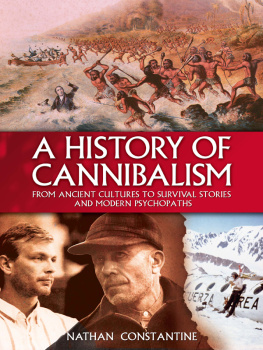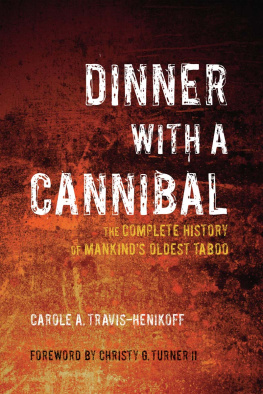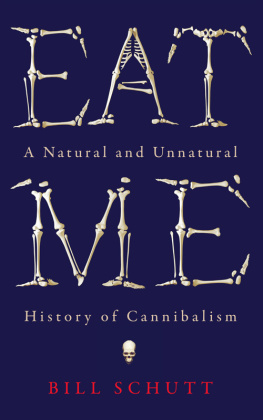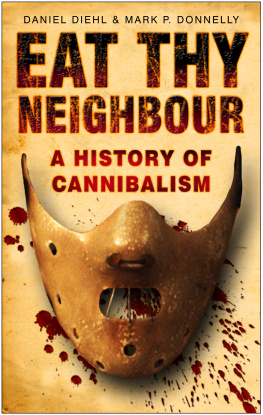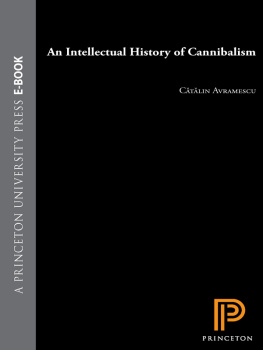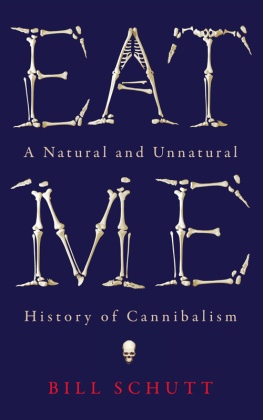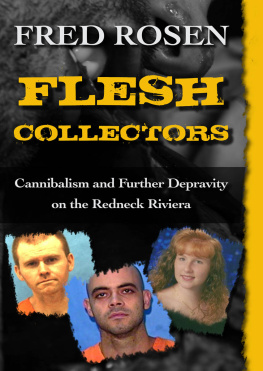All rights reserved. No part of this publication may be reproduced, stored in a retrieval system, or transmitted, in any form or by any means, electronic, mechanical, photocopying, recording or otherwise, without prior written permission in accordance with the provisions of the Copyright Act 1956 (as amended). Any person or persons who do any unauthorised act in relation to this publication may be liable to criminal prosecution and civil claims for damages.
Introduction
A t first glance, cannibalism seems easy to define: the practice of eating ones own kind as The Penguin English Dictionary succinctly puts it. That seems straightforward enough, but it begs any number of questions and glosses over a remarkable diversity. Chewing on a human liver seems unambiguously cannibalistic, but does the chewing of fingernail chunks qualify nail-biters as cannibals? What, essentially, is the difference?
Because it is so hard to pin down, and so often a question of context and circumstance, cannibalism comes in degrees of acceptability. At one extreme the chewed fingernail, at the other sadistic murder, mutilation and the roasting of flesh. In between these two extremes lie a multitude of possibilities. In ethical terms, it clearly makes a huge difference whether the source of meat is alive or dead. If the former, it obviously matters whether the donor was willing or not; if the latter, whether the would-be consumer was also the cause of death.
These days we tend to take the simple line. Everything is good or evil, and cannibalism clearly falls into the latter category. When a few poor souls find themselves trapped in the middle of nowhere without any food, and end up having to eat their companions, most of us agree they had no choice, and generously forgive their fall from grace, because we still believe that that is what it was a horrible necessity. But we still hold on to its wrongness; cannibalism is quite simply, and innately, unacceptable.
So why do people do it? Why since we are generally incapable of imagining a world very different from our own have people ever done it? There are three essential reasons: duty, desperation and desire. Or, put another way, because they ought to, need to or want to. This book is divided accordingly, though there is obviously an element of overlap many individuals and peoples have had more than one motive for eating their own. The Maoris, for example, found cannibalism both socially acceptable and necessary, and they also seemed to enjoy it. And when it comes to psychopathic behaviour, the line between needs and wants gets more than a little blurry.
Desperation and desire
Desperation cannibalism is easy enough to understand. There have been famines throughout history, on every continent, in areas of every size, from the wide Russian Steppes to narrow lifeboats in mid-ocean. Some of these famines have had natural causes, others have been the direct result of mans activities. The outcome, in any case, has usually been the same. Desperate people do desperate things, and hungry people eat what they can, even if it is other people.
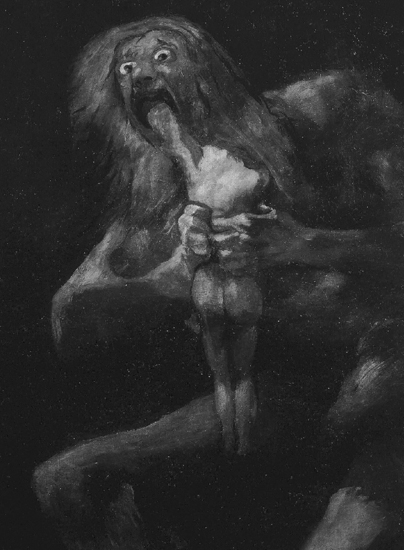
Goyas Cronus Eating His Children, illustrating a story from Greek mythology, highlights the enduring fascination Europeans have had with the idea of cannibalism throughout history
Desire cannibalism is much harder to understand, though abusive fathers, overbearing mothers, animal torture and extreme sexual dysfunction all seem to crop up rather frequently by way of a possible explanation for it. Humanitys history humanitys present, come to that contains groups who practise it culturally, but desire cannibalism in the modern world is largely the province of individuals, a family affair at most. Since society assumes that cannibalism is utterly wrong, and that those so inclined should be capable of restraining themselves, it follows that those who do not are the ultimate outsiders, people who give ordinary murderers a bad name. Few cannibal-killers have been found to be insane, but only because most juries have been so shocked by their actions that they have been all too eager to execute them.
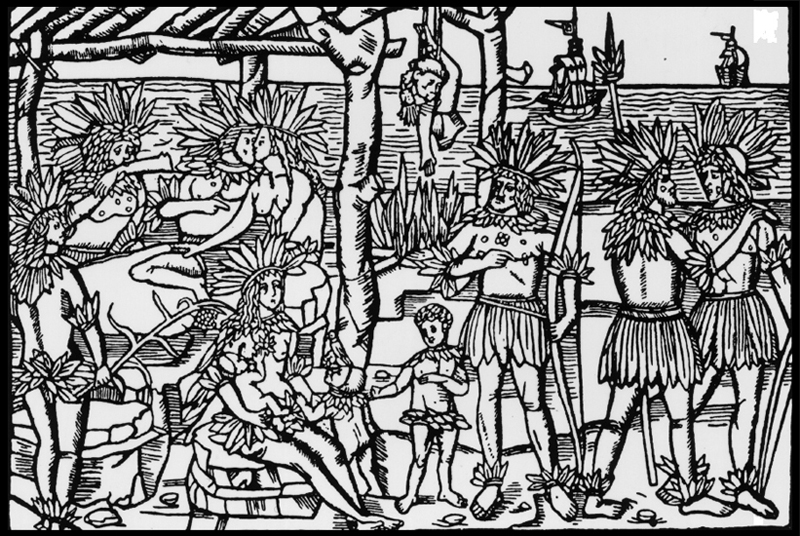
c. 1505: A European sailing ship sails warily towards the shores of the New World. The Caribs gave their name to cannibalism
The way things were
But first, duty or cultural cannibalism. By this, we do not mean one that demands that everyone eats as much human flesh as they can manage because it is the done thing to do. Duty cannibalism arises from a shared belief in many societies that eating other people actually helps their world go round, their culture cohere.
How, you might ask, could anyone believe anything so weird, so bad, so wrong? Well, those who dismiss such beliefs should look at their own. The world made in six days? The same world saved by a well-stocked boat of animals? All cultures, like all individuals, have their own ways of making sense of things they cannot understand. It is a case of culture, and that cultures beliefs and social mores.
So how might it help to eat other humans? What hopes could be fulfilled? If it is done for the gods they are bound to be grateful; theyll keep the world turning, keep the sun rising, keep the crops growing. And then there is the magic of flesh and blood, and the belief that it must be transferable. It does not take a huge stretch of the imagination to believe that consuming the flesh of a fearsome enemy would make you stronger, or that drinking the blood of the healthy might cure disease. So the Ashanti forced their cowards to eat the hearts of the brave, and the Pharaohs bathed in young blood to wash away leprosy; such transfers of corporeal assets carried all sorts of wonderful possibilities.
Simple notions for simple societies, you might think. Sixteenth-century France was much more sophisticated. Tie a naked, red-haired, male Catholic to a bench, one, presumably Anglican, medicinal recipe begins, and subject him to the unrestrained attentions of a number of venomous animals. When he has expired from the bites and stings, hang him upside-down with a bowl underneath to catch the drips. Mix these with the fat of a man who has been hanged, the entrails of children, and the corpses of the venomous animals who caused his death. Use as required ().
It was not just a matter of transference. Eating an enemy was a good way of punishing him, a satisfyingly complete form of revenge, a dramatic deterrent to others. And it was not just a matter of enemies. Eating dead relatives could save them from the loneliness of burial, and put a limit to the livings period of grief.
Dietary and economic factors also came into play. In some places, human flesh might be the only available source of protein. In others, it might provide the communitys main source of income, and if this was the case then chances were good that the practice would be considered morally acceptable. How many times have we heard politicians say that cutting back the arms trade would put too many jobs at risk?

